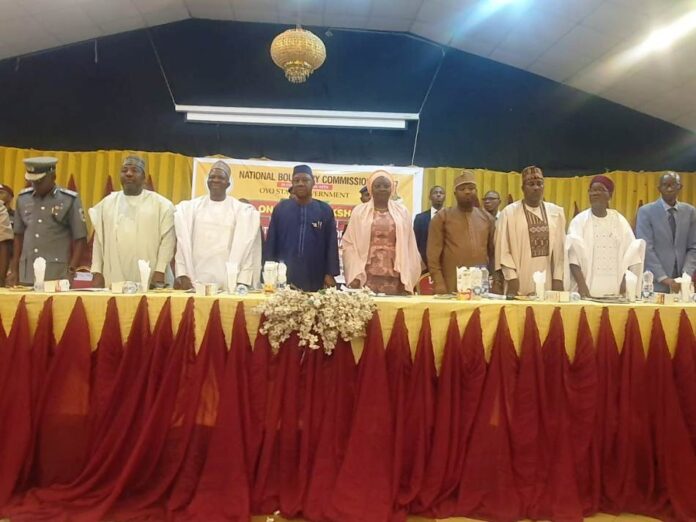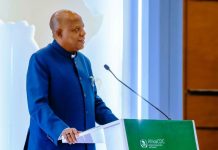
Apparently disturbed by the problems of insecurity and improved food security in line with the Renewed Hope Agenda of the President Bola Tinubu’s Administration, the federal government has convoked a one day workshop for the creation of Nigeria’s Platform for Local Border Authorities along Nigeria-Benin International Boundary to enhance cross border cooperation.
The workshop with the theme TRANSFORMING BORDERS FROM BARRIERS OF SEPARATION TO BRIDGES OF COOPERATION AND INTEGRATION was organized by the National Boundary Commission in collaboration with the Oyo State Government in Ibadan, the Oyo State Capital.
The Director General of the National Boundary Commission, Surv. Adamu Adaji said that the workshop is specifically tailored towards improving trans-border relations between composite regions and Local Border Authorities as well as the Traditional Rulers along Nigeria-Benin International Boundary.
“It is important to stress here that the government’s desire for Nigeria’s security and economic prosperity as well as the well-being of the people cannot be over emphasized.
“The Federal Government attaches great importance on the role of Border Local Government Authorities and Traditional rulers in the attainment of peaceful co-existence between Nigeria and her proximate neighbours”.
“Their roles are not only limited to the promotion of peaceful co-existence but also facilitating cross-border cooperation and regional integration.
Adaji emphasized that the workshop could not have come at a better time owing to the rising challenges of insecurity along our international borders and the government’s desire for economic cooperation and integration across borders of the African continent.
The Director General further said that this was the reason Nigeria recently ratified and deposited the African Union Convention on Cross Border Cooperation.
Known as the Niamey Convention, the Convention aims at paving ways for cross border cooperation at local, sub-regional and regional levels as well as to ensure effective and integrated border management.
It also seeks to combat cross border crime, terrorism, piracy, and other forms of crimes as well as to transform border areas into catalysts for growth, socio-economic and political integration of the continent and the deepening of its unity.
Adaji noted that this goal can only be maximally achieved with the creation of a Local Border Platform.
According to him, the African Ministers in charge of Border Management during their 4th Conference in Addisa Ababa, Ethiopia, in 2016 had unanimously agreed that Africa’s peace and security are directly intertwined with good border governance and the attainment of sustainable developments in the borderlands.
Border States and Local Governments that are far from National Capitals have a critical role to play because of their proximity to the borders and borderlands he added.
The Director General stated that Nigeria has about 4500km land border and around 850km stretch of maritime border.
He urged the traditional rulers to engage with their counterparts in the neighbouring countries to address the problem of insecurity along the border corridors adding that providing effective policing across the length of this expansive territorial borders would no doubt require not only the commitment of our combined security operatives but also the support of our local border authorities and borderland communities who are the main gateways to our nations.
The governor of Oyo State, Engr. Seyi Makinde represented by his Deputy, Barr. Abdul-Raheem Lawal commended the National Boundary Commission for putting up the workshop.
He called on the federal government to formulate a strategy that will strengthen the already existing bilateral relationship between Nigeria and Benin Republic.
Deputy governors of Ogun State Engr. Noimot Salako-Oyedele, and her counterparts from Kwara, Niger, Lagos and Kebbi States who were represented at the occasion lauded the efforts of the NBC in organising the workshop to address the menace of insecurity and tinker solutions that will enhance cross border trade in the country.
The traditional rulers from within the communities along the international borders unanimously agreed that the lack of infrastructure and insecurity have greatly impeded on their communities.
They lamented that these factors have continued to pose a setback to the development of the communities along the Nigeria-Benin international borders.
Efe Ovuakporie
Head Information Unit





